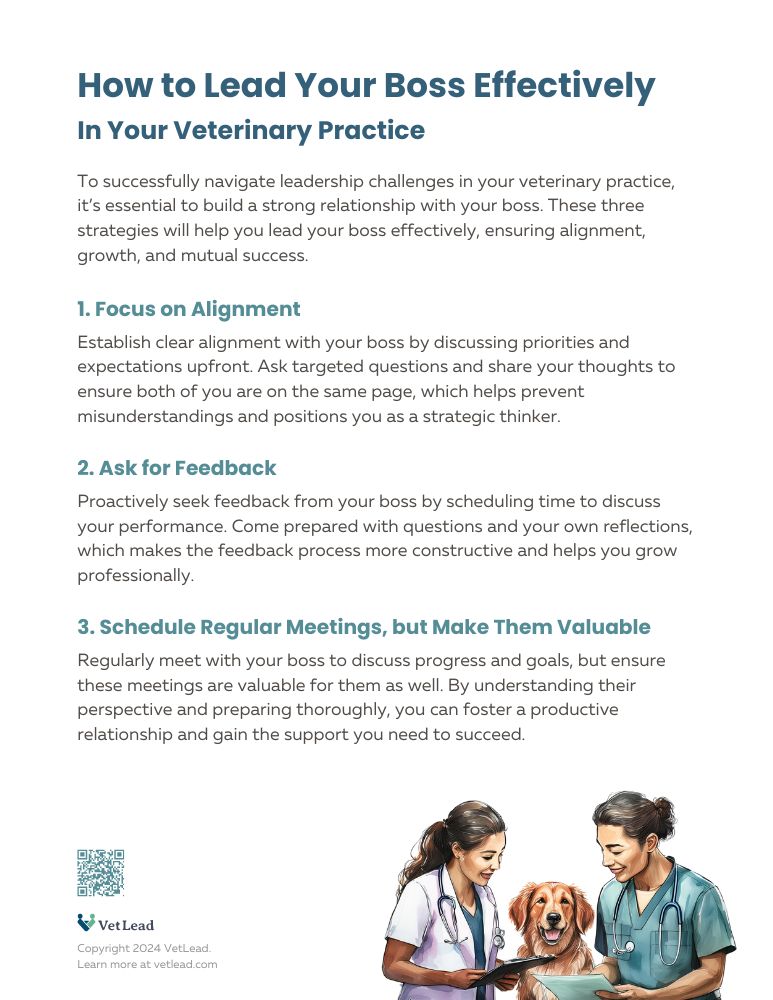I hear it a lot when working with veterinary managers and supervisors: “I wish my boss were here to learn this.” It’s challenging not to focus on becoming a better coach while sometimes wishing there were better managers around you—or, more importantly, that you had one of those better managers as your boss.
The Importance of Leadership Development
This sentiment highlights a common reality in veterinary practices: not all bosses are great leaders. It underscores the importance of developing into an effective coach so that our teams aren’t left wishing we were better at guiding them toward success.
Even as we consider these possibilities, the reality remains that many of us believe we could be more successful if our boss were a better leader. That’s likely true, and it’s why leadership development is so important. It’s the key to improving entire veterinary teams, practices, and the broader field of veterinary medicine. While the industry evolves—whether through new treatments, technologies, or client expectations—having strong leaders ensures that we can adapt and continue building a successful future, no matter how the landscape changes.
Leading When Leadership is Lacking
So, what do we do when we find ourselves wishing our boss were a better leader? How do we continue to lead our teams effectively, enjoy our work, and secure our future, even when the person above us isn’t fully supporting our growth, challenging us to reach new heights, or considering our goals and best interests?
One of the most interesting aspects of veterinary leadership is that it isn’t confined to those who report to us. We can lead upward just as effectively. While it may require a shift in perspective, the same processes and habits we use to guide our teams can be applied to leading our boss.
If we view leadership as the ability to inspire others to think differently, make better choices, and develop habits that lead to success, then we can lead anyone—regardless of their position or authority.
Three Strategies to Lead Your Boss Effectively

Here are three strategies you can use to lead your boss more effectively and achieve greater success:
Focus on Alignment.
Many challenges with bosses arise from differing priorities or expectations. Say you want to improve the process of how follow-ups are scheduled in your practice, or the way the front desk communicates with other team members. To create alignment, start by asking questions like: How would you define success for this improvement? What do you see as our most important areas of focus this week? Based on similar situations in the past, what would you change about how I approach this? What should I focus on as I begin this work?
Use these questions to establish alignment, but be ready with your own answers as well. Many leaders prefer to hear your thoughts first, allowing them to understand your thinking, assess your progress, and provide constructive feedback. This approach not only helps align expectations but also positions you as a proactive, strategic thinker.
You can also create alignment and position yourself as a strategic thinker by clearly outlining your plans, proposed changes, and ideas in writing, and then setting aside time to discuss them. For example, you might say, “Here’s how I plan to improve our follow-up scheduling process. These are my thoughts, the challenges I anticipate, and the outcomes I’m committed to achieving.” Just think how much smoother things would run if your team members approached you with this level of preparation and clarity.
The Veterinary Leadership Program
Get info on this exclusive program.
Learn how to:
- 1Build an accountable team
- 2Make change happen
- 3Improve performance
- 4Hire exceptional talent
Includes live coaching.
Investment will be $897 per person
Ask for Feedback.
Many bosses in veterinary practices struggle with giving feedback, often delaying difficult conversations for too long. To get the feedback you need, set up a time to discuss it, and come prepared with questions and your own perspective on what you could do differently next time. This proactive approach helps you gain valuable insights that will support your growth.
Preparing for feedback mentally also makes a big difference. When we know it's coming, we’re less likely to react defensively and more likely to take it constructively. By doing your own self-assessment beforehand, you can compare your performance against your highest standards, making the feedback session even more productive.
Schedule Regular Meetings, but Make Them Valuable for Your Boss.
As you know, developing people is hard work. It takes significant effort, planning, time, and thought to do it well. If we can do some of that work for our boss, we can make their job easier while still getting the support and guidance we need. Even if we don’t always agree with our boss’s ideas, priorities, or feedback, it’s far better to understand their perspective than to dismiss it or hold onto resentment.
It’s important to recognize that hearing from someone with a different level of experience, a broader view of the practice, or different perspective can help us grow. Even if we believe they’re wrong, their insights can challenge us to think differently and refine our approach.

Download this Accompanying PDF Now
How to Lead Your Boss Effectively
Share it with leaders and teams. No email address required.
Are you on the same page with your boss? Share you stories in the comments below.